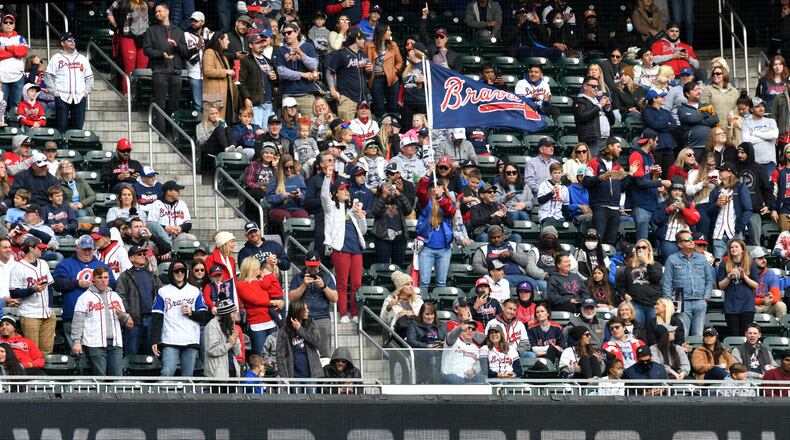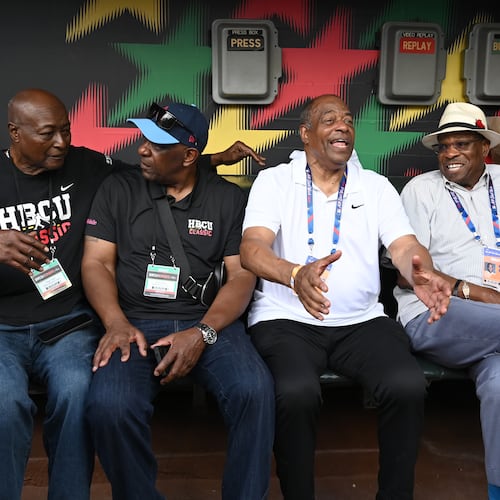The Braves’ local television revenue will increase significantly beginning in 2023, according to figures presented at an investors conference held by team owner Liberty Media on Thursday.
The Braves currently receive slightly more than $80 million per year from Sinclair Broadcast Group’s Bally Sports for local TV rights, but that will surpass $100 million in 2023 and approach $120 million in 2027, the final season of the Braves’ 20-year TV contract.
“We were recently able to lock in 2023 through 2027 at a higher per-game rate,” Braves President and CEO Derek Schiller told the investors in a video presentation.
The escalation isn’t the result of a new contract, but of a renegotiation years ago of some of the team’s TV rights.
Also at Thursday’s conference, held in New York, Liberty Media CEO Greg Maffei was asked in an interview with CNBC’s David Faber if this would be a good time to consider selling the Braves, coming off a World Series championship.
“We are not sellers,” Maffei answered. “First of all, just starting with the structure we have, while (the team) sits in a (tracking stock), really it would be very unattractive from a tax perspective (to sell). Unlikely to do that. Could we, somewhere down the road, do different things to create optionality around that asset? Surely.”
Possibilities, as has been speculated for years, could include a spinoff of the Braves by Liberty Media into a stand-alone publicly traded company, which potentially could facilitate an eventual sale.
Maffei told Faber that Liberty has had “a heck of a run” with the Braves, which the company acquired as part of a larger transaction with Time Warner in 2007. “Improved TV deal, new facility down there at Truist Park, The Battery (Atlanta) around it, improved on-field performance,” Maffei said, “it has been a pretty good run.”
He said a recent transaction involving another Liberty Media holding, satellite radio provider SiriusXM, created “what’s called an active trade or business” and therefore “more flexibility and optionality” for further moves. He said the company has “no plan or intent” for a specific near-term move and “will look at the opportunities as they arise.”
Maffei has described the Braves’ local TV deal as “good but not great” in comparison with other teams. Over the years, Braves fans often have criticized the deal and blamed it in part for the team’s player payroll not being higher. A more recent concern is that the Bally Sports networks aren’t available on increasingly popular streaming services such as YouTube TV and Hulu.
“We continue to believe that direct-to-consumer (TV) is critical to our future,” Schiller said, “and we are actively engaged with Major League Baseball in developing what the future of streaming looks like.”
Schiller’s comments regarding the TV deal were part of his upbeat presentation to investors about the Braves, who continue to bask in the World Series afterglow.
“Entering the 2021 season, there was a lot of uncertainty about how fans would return to baseball (amid the pandemic),” Schiller said. “We were very optimistic, and our attendance numbers still exceeded our high expectations.”
He said the Braves’ average ticket price ($44.91, up from $36.67 in 2019) and average gate receipts per game ($1.32 million) were the highest in franchise history for the regular season.
The Braves’ corporate sponsorship revenue also was strong at about $80 million this year, according to a slide presentation shown at the investors meeting.
“We’re very bullish about expanding our already strong (sponsorship) revenue stream,” Schiller said. “In addition to the opportunities a World Series championship presents, we also see opportunities in gaming, technology and new assets like player uniform patches.”
Overall, the Braves’ 2021 revenue was $466 million through Sept. 30. The Braves will exceed their franchise-record full-year revenue of $476 million, set in 2019, when October-through-December financial results, including the postseason games, are added to this year’s total.
About the Author
Keep Reading
The Latest
Featured



